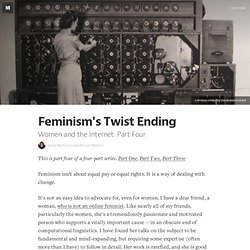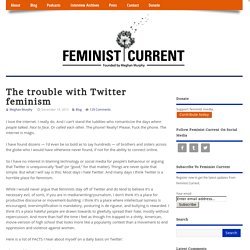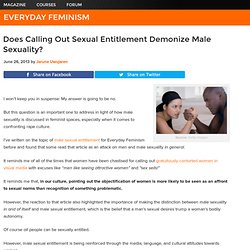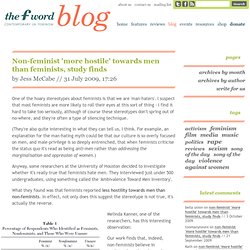

Feminism's Twist Ending — LadyBits on Medium. This is part four of a four-part series.

Part One, Part Two, Part Three Feminism isn’t about equal pay or equal rights. It is a way of dealing with change. It's not an easy idea to advocate for, even for women. I have a dear friend, a woman, who is not an online feminist. I am so happy she does what she does. But just by being where she is, she upends assumptions about women all the time. Where we've had fights, and we have, I believe they have mostly arisen out of the fact that she gets policed by the geek feminism crowd for not being interested in their fights. Geek women don't all have to be working on issues around women and technology. For geek feminists who criticize the women (or men) who don't want to let these issues take up their time, I have a simple question: What have you done lately to help people of color get involved in the tech community and to get equal access to online life and resources?
The feminism I fell head over heels for was a big feminism. And. The trouble with Twitter feminism. I love the internet.

I really do. And I can’t stand the luddites who romanticize the days where people talked. Face to face. Or called each other. The phone? I have found dozens — I’d even be so bold as to say hundreds — of brothers and sisters across the globe who I would have otherwise never found, if not for the ability to connect online. So I have no interest in blaming technology or social media for people’s behaviour or arguing that Twitter is unequivocally “bad” (or “good,” for that matter). While I would never argue that feminists stay off of Twitter and do tend to believe it’s a necessary evil, of sorts, if you are in media/writing/journalism, I don’t think it’s a place for productive discourse or movement-building.
What Joss Whedon Gets Wrong About the Word 'Feminist' - Noah Berlatsky. To claim that equality is the natural order is to forget the entire history of feminism.

Joss Whedon thinks feminism has a branding problem. He's hardly the first person to make that claim, though the tack he takes in his acclaimed speech at Equality Now is a little unusual. Rather than discussing the feminist movement per se, Whedon talks specifically about the word, "feminist" as a formal exercise in poetry. He likes the first syllable, is okay with the second … but he really dislikes "ist.
" It's "Germanic, but not in the romantic way; this terrible ending with a wonderful beginning. " As it turns out, Whedon's objection is not purely aesthetic. Whedon doesn't mention Rousseau by name. Which, given Whedon's presuppositions, makes sense. Does Calling Out Sexual Entitlement Demonize Male Sexuality? I won’t keep you in suspense: My answer is going to be no.

But this question is an important one to address in light of how male sexuality is discussed in feminist spaces, especially when it comes to confronting rape culture. I’ve written on the topic of male sexual entitlement for Everyday Feminism before and found that some read that article as an attack on men and male sexuality in general. It reminds me of all of the times that women have been chastised for calling out gratuitously contorted women in visual media with excuses like “men like seeing attractive women” and “sex sells!”
It reminds me that, in our culture, pointing out the objectification of women is more likely to be seen as an affront to sexual norms than recognition of something problematic. Of course all people can be sexually entitled. However, male sexual entitlement is being reinforced through the media, language, and cultural attitudes towards women. What Male Sexual Entitlement Looks Like That’s sexual entitlement. Non-feminist 'more hostile' towards men than feminists, study finds. By Jess McCabe // 31 July 2009, 17:26 One of the hoary stereotypes about feminists is that we are 'man-haters'.

I suspect that most feminists are more likely to roll their eyes at this sort of thing - I find it hard to take too seriously, although of course these stereotypes don't spring out of no-where, and they're often a type of silencing technique. (They're also quite interesting in what they can tell us, I think. For example, an explanation for the man-hating myth could be that our culture is so overly focused on men, and male-privilege is so deeply entrenched, that when feminists criticise the status quo it's read as being anti-men rather than addressing the marginalisation and oppression of women.)
Anyway, some researchers at the University of Houston decided to investigate whether it's really true that feminists hate men. What they found was that feminists reported less hostility towards men than non-feminists. The study's take on this: Permalink.